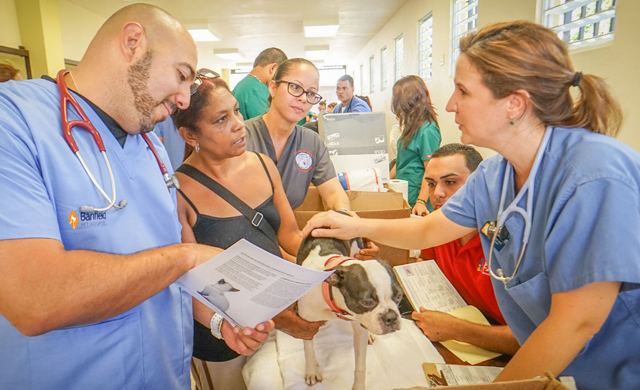
Banfield’s Dr Jesus Aramendi Discusses the Health Benefits of Pet Companionship
05/12/2016 10:31AM | 11273 viewsDr. Jesus Aramendi is regional medical director for the southeast region of Banfield Pet Hospital. He started as a veterinarian more than 15 years ago and has been with Banfield for the last nine. Between his career in the field, his personal experience with pets from childhood and the data he sees coming out of the Human Animal Bond Research Initiative (HABRI) Foundation, he believes strongly in the health benefits of having a pet in your life.
“From what I have experienced personally and professionally, there is no question in my mind that the human-animal bond can improve overall health, both physically and mentally,” says Dr. Aramendi. “So much so that I have often felt like I’m helping people with their health as much as I am their four-legged family members.”
He’s not alone in his observations. According to survey results published by HABRI, the vast majority of physicians agree with him. When asked about what they were seeing with their patients’ health and how it linked to pet ownership:
· 97% of doctors surveyed said they believe there are health benefits to having a pet.
· 75% believe pet ownership had improved patients’ physical health.
· 87% reported that pet companionship had improved patients mood or outlook.
It seems likely that having a pet companion can indeed make you happier, but can it really improve your physical health? A study commissioned by HABRI found that it can – to the tune of $11.7 billion in health care cost savings from healthier pet owners who made fewer visits to the doctor’s office and had reduced obesity rates.
In his practice, Dr. Aramendi not only witnessed the benefits, but proactively worked to make them happen. His focus was often on preventing or reversing obesity in pets, so whenever he saw a dog that was overweight, he would use it as an opportunity to encourage people to develop an even deeper bond with them through exercise. With regular walks around the neighborhood, clients who were overweight would lose weight right along with their canine companions.
There are health benefits for cat lovers too, says Dr. Aramendi. The American Heart Association suggests a link between pet ownership and cardiovascular benefits that reduce heart disease risk factors. He also cites data shared by HABRI that the risk of death from heart attack is 40% higher for those who never owned a cat. This is likely attributable to the controlling of stress levels brought on by the caring and nurturing of a pet, which can lower blood pressure and other risk factors for those with cat companions.
Having a pet can bring mental health benefits too. “I’ve had some clients who were suffering from depression and saw the changes when they started focusing on something other than themselves,” recounts Dr. Aramendi. “The acts of caregiving and being responsible for another being can be very beneficial, not to mention the bonding and attachment that develops. With a dog, it’s also a way to get out of the house and not only exercise, itself good for mental health, but to interact more with neighbors and meet new friends at the dog park.”
As far as what to look for in a pet, it depends on your motivation for getting one. If you’re looking to make health improvements – whether physical or mental – an active dog such as a Labrador retriever or shepherd is a good choice for sharing outdoor activities and socializing. If you’re older or have a health condition, you’ll obviously want a smaller dog or cat, or perhaps a less active, senior pet. It’s often tempting to get more than one pet – a companion for your companion pet – but for those dealing with depression, post-traumatic stress disorders or other mental health issues, the one-on-one bond with a special pet may be the most beneficial.
For children, puppies and kittens are a good choice in terms of bonding with a pet and also learning how to take care of one. “My siblings and I grew up with pets, so I know from personal experience the things they can teach us from a young age, such as caring for others and developing compassion and empathy,” relates Dr. Aramendi. “Our early interactions with pets prepare us to be better adults, and in my case, was instrumental in the career path I chose.”
Research has shown that exposure to dogs and cats at a very young age reduces the risk of developing allergies as we grow older and into adulthood. And pets – who can provide psychological and emotional benefits to children in the best of circumstances – can also be instrumental in helping kids cope with serious issues, such as autism or the emotional distress of chronic disease. In some cases, they can even save lives.
This is exciting news for the future direction of the human-animal bond. But for most pets, no special training is needed; just the opportunity to give someone their companionship and unconditional love.
For those thinking about adopting a pet, Dr. Aramendi offers one final piece of advice: consult with a veterinarian who will be glad to help you decide the right pet for you based on your current situation and any health related goals you have – and then can help you maintain the health of your pet through regular physical exams and preventive care.
For more information, be sure to visit the following:
Banfield Pet Hospitals, partners in preventive pet health care.
Human Animal Bond Research Initiative announces 2015 research grants.
Pet Partners, which manages the certification process for therapy dogs.










Post your Comment
Please login or sign up to comment
Comments